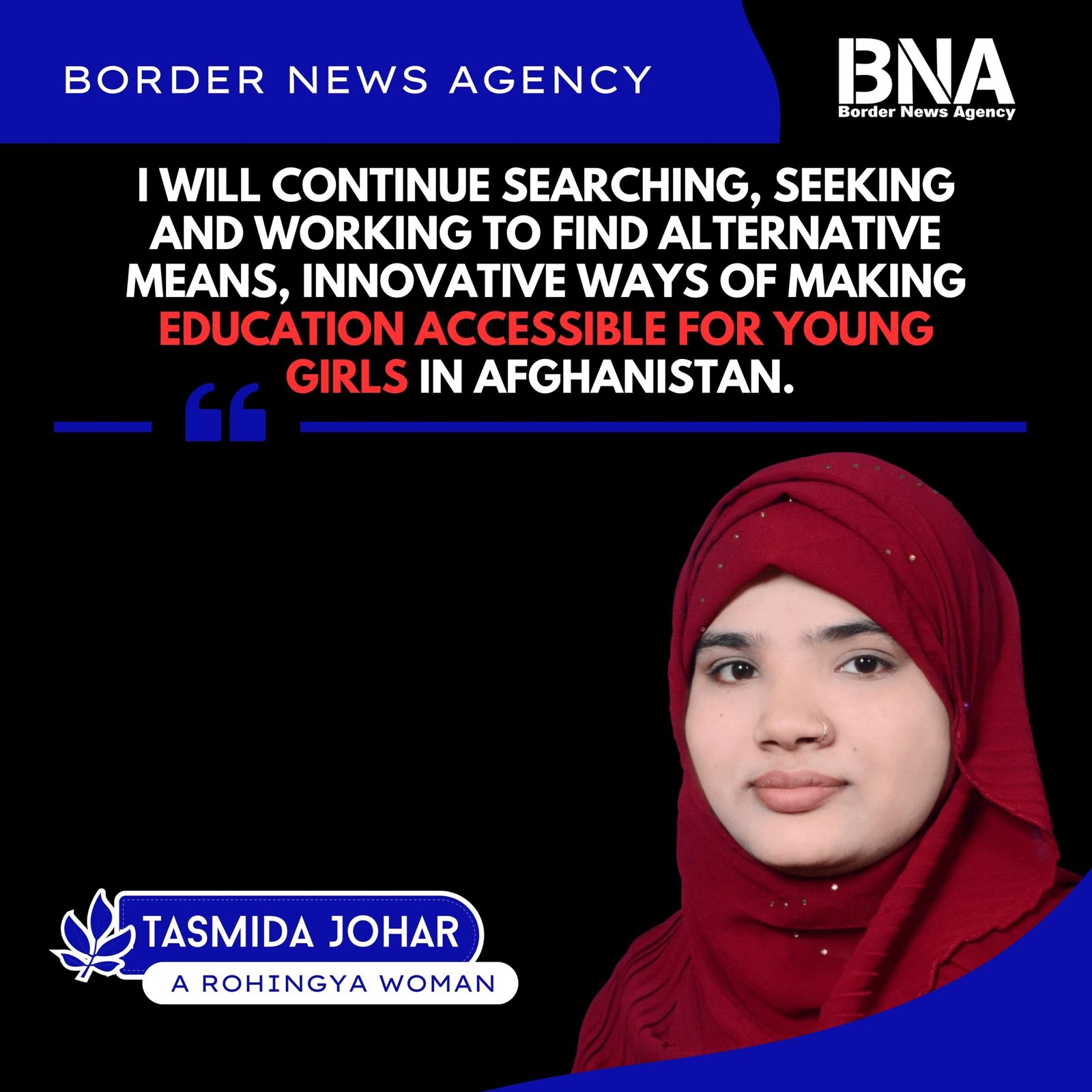Border News Agency
Cox’s Bazar, Bangladesh – March 8 ,2025
On International Women’s Day, a powerful voice emerges from the refugee camps, speaking for the millions of girls who are denied an education. Tasmida Johar, a Rohingya woman and activist, has dedicated her life to fighting for access to education for marginalized girls, especially in crisis-affected regions like Afghanistan.
Tasmida, who grew up in a refugee camp in India, is one of the few Rohingya women to have attended university. Today, she stands as a symbol of resilience and hope for thousands of displaced women and girls, vowing to continue her mission of ensuring access to education despite obstacles.
A Determined Effort to Expand Education Access
Johar’s message is clear and urgent. “I will continue searching, seeking, and working to find alternative means, innovative ways of making education accessible for young girls in Afghanistan,” she declared.
Her statement highlights the growing global concern over the worsening educational crisis for girls, particularly in war-torn and politically unstable regions.
In Afghanistan, where the Taliban has banned girls from secondary and higher education, the situation remains dire. Organizations working in the country report a significant rise in child marriages, poverty, and mental health struggles among young girls who have been locked out of classrooms. The ban has also drawn widespread condemnation from the international community.
Johar believes that alternative education models, online platforms, and international scholarship opportunities must be urgently developed to counter these restrictions. She is working alongside various organizations and activists to explore ways to bring education to the most vulnerable.
Growing Up as a Refugee: Tasmida’s Journe
Tasmida’s advocacy is deeply personal. Born into a stateless community, she grew up in an environment where education for girls was neither prioritized nor easily accessible.
As a Rohingya refugee in India, she faced social stigma, discrimination, and financial hardship, all of which made her journey to university extremely challenging. But against all odds, she managed to pursue higher education and become one of the few Rohingya women with a university degree.
“I was told that girls do not need education, that our fate is already written,” she recalled. “But I knew education was the only way to change my future and help my community.”
Many refugee women, particularly in camps across Bangladesh, Myanmar, and India, continue to be denied education due to economic struggles, early marriage, and cultural barriers. Even for those who want to study, resources remain scarce, and opportunities are limited.
Rising Concerns Over the Education Crisis in Conflict Zones
As Johar continues her advocacy, experts warn that the education crisis is worsening for girls worldwide, particularly in refugee camps and conflict-affected areas.
The situation in Afghanistan is being described as one of the worst educational crises for women in modern history. Since the Taliban’s takeover, more than 1.2 million Afghan girls have been banned from school, forcing many into domestic labor and early marriage. The UN has called the ban a violation of human rights and urged global intervention.
Meanwhile, in Rohingya refugee camps, the challenges are equally alarming. Only a small percentage of Rohingya girls receive secondary education, and many schools operate with severe shortages of teachers, materials, and funding. Organizations like the UNHCR and UNICEF continue to push for better policies, but progress is slow.
Johar warns that without immediate action, an entire generation of girls will be lost to illiteracy, poverty, and oppression.
“Girls deserve the right to education, no matter where they are born. The world cannot afford to ignore this crisis.”
Resistance and Challenges in Advocacy
Despite her efforts, Johar has faced resistance from within her own community. Many Rohingya families continue to hold traditional views that discourage girls from pursuing education, believing that women should focus solely on domestic responsibilities.
She has also encountered threats and opposition from extremist groups who view her activism as a challenge to cultural and religious norms. But she remains determined, insisting that education is not just a right, but a necessity for every girl.
“I will not stop. I will keep fighting, because education is the only way to break the cycle of poverty and discrimination,” she said.
A Call for Global Action
As the world marks International Women’s Day, Johar is using this moment to call on governments, organizations, and individuals to take urgent action in addressing the global education crisis for girls.
She urges policymakers to:
• Increase funding for education programs in refugee camps and conflict zones.
• Develop alternative education methods, such as online learning and underground schools.
• Offer more scholarships and training programs for refugee and displaced girls.
• Pressurize governments that restrict girls’ education to change their policies.
“The world cannot stand by while millions of girls are denied education,” she said. “It is time to act.”
Johar’s words serve as a powerful reminder of the urgent need to defend the rights of girls everywhere. As her advocacy gains global attention, she continues to inspire women and young girls to fight for their dreams, no matter the obstacles.
For her, the message is clear: education is the key to empowerment, and no girl should ever be left behind.
Thank you so much for sharing!
Rohingya Activist Tasmida Johar Leads Fight for Girls’ Education on International Women’s Day

By
Reading Time: 4 mins read
0
A
A
0
SHARES
18
VIEWS





